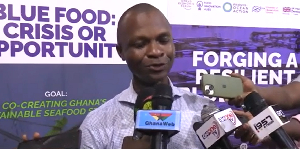"I don't think I've ever been so surprised. I thought I might be hearing things," chuckles Sway Dasafo, the unsigned rapper who emerged as the unlikely star of this year's Mobos when he was named best hip-hop act, beating American heavyweights 50 Cent and the Game to the award.
The result, which was voted for by the public, was particularly surprising because little is known about the 23-year-old from Hornsey, north London.
Sway - real name Derek Safo - is the first to admit that his win will have come out of the blue for most observers. "A lot of people must be wondering how I got nominated in the first place if I haven't even got an album out. What they don't know is that I've already released two albums on the street."
In the past 12 months Sway has recorded two mix-tape CDs - This Is My Promo, volumes one and two - which he sold himself on the internet, on the streets and after gigs, and distributed to independent record stores nationwide, often delivering them personally in a van.
Unlike traditional albums, mix-tape CDs blend bootlegged beats with home-grown raps and original music; aspiring MCs record them at home, taking advantage of relatively cheap equipment to burn CDs for mass distribution.
Where other artists on the mix-tape circuit, however, tend to sell in the hundreds, Sway estimates that he has sold around 10,000 copies of his two albums. He's had a lot of support from pirate radio stations and 1Xtra, the BBC's black music radio station, which playlisted his first song, On My Own, three years ago and has played his releases ever since.
He's also been helped by fans such as Dizzee Rascal, whom Sway supported on a national tour last year, and the Mitchell Brothers (he featured on their song Harvey Nicks). Perhaps his most canny move, however, has been to use money generated from mix-tape sales to fund videos for songs such as Up Your Speed and Flo Fashion, winning him heavy rotation on MTV Base and Channel U.
"Mix-tapes effectively provide a diary of my life," says Sway. "They feature skits and interviews of me on radio. When people follow your story, they feel closer to you - it's like a soap opera. People want to know what's going to happen next." This is why, he says, he was successful at the Mobos. "Everywhere I went people on the streets said they had voted for me. In the UK people like to support their own and they come together to make things like this happen."
The underground buzz surrounding Sway has prompted considerable interest from labels but the rapper insists he will release his debut album in January on his own label, Dcypha Productions, before considering any offers. "If my plan was to get signed I would've done it by now. Obviously I can't be independent for ever because there will be a point when I need a lot more money to promote myself, but I want to go as far as possible.
"I want a good deal. It isn't about greed - I want to retain a large degree of artistic control. I know of artists who were signed and then dropped. One minute everyone is being nice to them and the next moment no one wants to know. I didn't want a label to throw money at me and tell me how they wanted me to sound. I want to see what I can create by myself."
Sway was 10 when he started rapping as a hobby, and 13 when he began making beats on his computer. Producing beats for other MCs soon followed, but at 16 he decided to promote his own rhyming skills. He started taking part in MC battles on London's hip-hop scene and later formed an 11-strong crew called One with a group of friends.
By the time they disbanded in 2002 they had released a mix-tape, Onederful, and been finalists in the Mobo award for unsigned artists, and Sway had learned the guerilla tactics needed to make a name in the underground hip-hop scene.
He says his business acumen is the product of the strict Ghanaian upbringing he received from his parents, who were more concerned with academic results than their son's dreams of emulating his musical hero, Michael Jackson. Their views soon changed, however, as his peers became embroiled in what he calls "street situations".
"A lot of the people I grew up with ended up in these situations. People went to prison and there were stabbings. My parents only cared about education, but after seeing how some of my peers turned out, pursuing a career in music didn't seem so bad. They thought it was better than me being out on the streets."
His complex, witty lyrics are notable for the absence of violent imagery - something the rapper says he consciously avoids. "I'm a positive person and this positivity comes out in my music. I don't go round holding guns to people's heads, so I won't rap about holding guns to people's heads. Trouble attracts trouble. If you rap about trouble, it will come to you."
Although he's only just arrived on the mainstream scene, Sway is already plotting his next move - including the end of his rap career. "I was a producer before becoming a rapper, and I want to end up producing. I don't want to rap for ever. There is only so far you can take it and there are only so many stories you can tell.
Eventually, I'd like to be a successful producer who is able to start signing talent and make sure my parents are in a comfortable situation. It'd be nice to have three cars, too ... and a kid. That's not too much to ask, is it?"
Music of Wednesday, 28 September 2005
Source: ghanamusic.com












